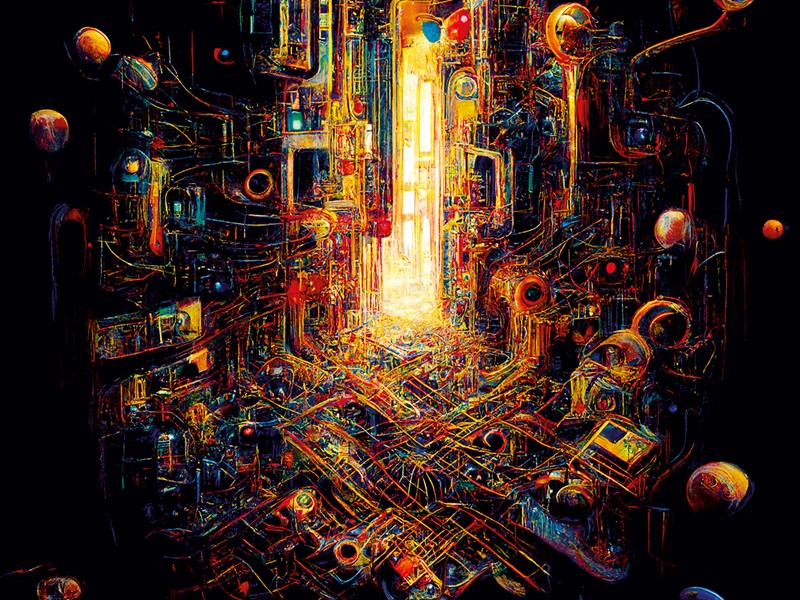
The Neural Enhancer
Evelyn Pierce stared at the flickering holographic screens in her laboratory, the blue glow illuminating her dismayed expression. Dr. Pierce’s groundbreaking research in neuro-technology had attracted global attention and made her a global sensation, but something about her invention had been bothering her and now she had found it—an enigma buried deep within her latest creation, the Neural Enhancer.
It was 2045, and the world was on the brink of a neuro-technological revolution. Dr. Pierce, a visionary neuroscientist, had developed a device that promised to augment human cognitive abilities. The Neural Enhancer boasted the potential to unlock dormant parts of the brain, amplifying intelligence, memory, and creativity, essentially making people smarter.
Evelyn had devoted years to perfecting the device, often working late into the night in her secluded laboratory. She understood the risks of her invention—the ethical implications, the unpredictable side effects—but her pursuit of scientific advancement overshadowed any doubts she harbored. Until now. She remembered how it all began, eight short months ago.
The day of the device’s first human trial finally arrived. Marcus, a volunteer test subject, eagerly awaited the opportunity to transcend the limitations of his mind. Marcus was young, healthy smart, and single. He fit all the demographics required of the test subject. He was conscious and smiling as the helmet was fitted over his head and the electrodes attached to his shaved skull. The table on which he was positioned was surrounded by the implementation team led by Dr. Pierce and the mezzanine gallery filled with onlookers; medical professionals, scientists, politicians, and the inevitable press.
As the Neural Enhancer was activated, Marcus’s eyes closed for a few minutes, then opened again wide with wonder. In response to the queries from the team, he described an indescribable surge of clarity, a flood of knowledge, as if a veil had been lifted from his consciousness. The whole process took only thirty minutes and Marcus was conscious and lucid the whole time. When the experiment ended, the team and the entire gallery broke out in spontaneous cheering.
In the following weeks, Marcus became a sensation, dazzling audiences with his newfound brilliance. Media outlets hailed the Neural Enhancer as a marvel, and Evelyn basked in the glory of her creation.
As the weeks became months, beneath the facade of success, doubts began to gnaw at Evelyn’s conscience. She noticed subtle changes in Marcus—moments of confusion, fleeting lapses in memory. But her determination to push the boundaries of her science eventually trumped her concerns.
More months passed, and hundreds of eager volunteers underwent the Neural Enhancement procedure. Each displayed remarkable cognitive enhancements, and a backlog for spots on Dr. Pierce’s clinical trials program built up. But a disturbing pattern began to emerge—a pattern Evelyn couldn’t ignore. Weekly data reports spoke of unexplained blackouts, inexplicable behavior, and inexplicit gaps in memory among the subjects.
Evelyn buried herself in data analysis, dissecting every facet of the Neural Enhancer’s programming. And now, in the flickering figures on her laboratory screens, she uncovered the chilling truth—a flaw in the device’s algorithm, a flaw she had suspected, but overlooked in her pursuit of innovation.
The Neural Enhancer wasn’t just enhancing brain functions; it was consuming them. Like a voracious entity, it fed on the neurons responsible for memory and cognition, offering brief bursts of brilliance in exchange for the gradual erasure of the mind.
Horror gripped Evelyn as the implications sank in. Her invention, touted as a beacon of progress, was a harbinger of destruction, a silent thief stealing the essence of humanity itself.
Evelyn knew she had to act swiftly. With a heavy heart, she prepared to disable her creation and disclose the truth to the world Just then, a knock broke the stillness in the lab.
It was Marcus, once hailed as a prodigy, now haunted by shadows of forgotten moments. Once brimming with intelligence, his eyes now held a glint of confusion.
“Dr. Pierce, something’s wrong. I’m starting to forget things,” he murmured, his voice tinged with uncertainty.
She met his gaze, her heart aching with guilt. “I know, Marcus. I’m sorry. There’s a flaw—a fatal flaw in the Neural Enhancer.”
Marcus looked at her blankly. He didn’t seem to understand what she was saying. She tried again.
“Marcus, there’s something wrong with the Neural Enhancer. It’s affecting your mind and it’s irreversible. I’m so sorry. I didn’t know…”
For a moment he seemed nonplussed, and then Marcus nodded. “Oh, is that what it is? Thank you, Dr. Pierce.”
Her heart broke as he smiled at her and turned and left the room. He had grasped what she was saying but not the implications.
There was no going back. Evelyn knew she couldn’t erase the damage already done to Marcus and all the others who had undergone the treatment. The secret behind the Neural Enhancer, concealed by her relentless pursuit of progress, needed to be laid bare to the world—a cautionary tale of the perils lurking within unchecked technological advancement. As for Dr. Evelyn Pierce, she would be relegated to the dustbin of history, hailed not as a pioneer but remembered as someone who destroyed the lives and minds of her subjects in her thirst for power and recognition.







